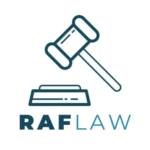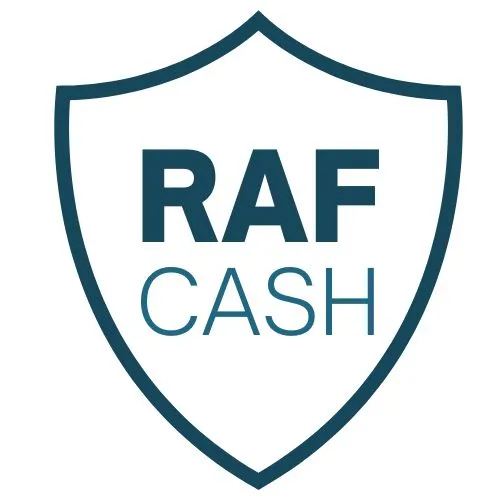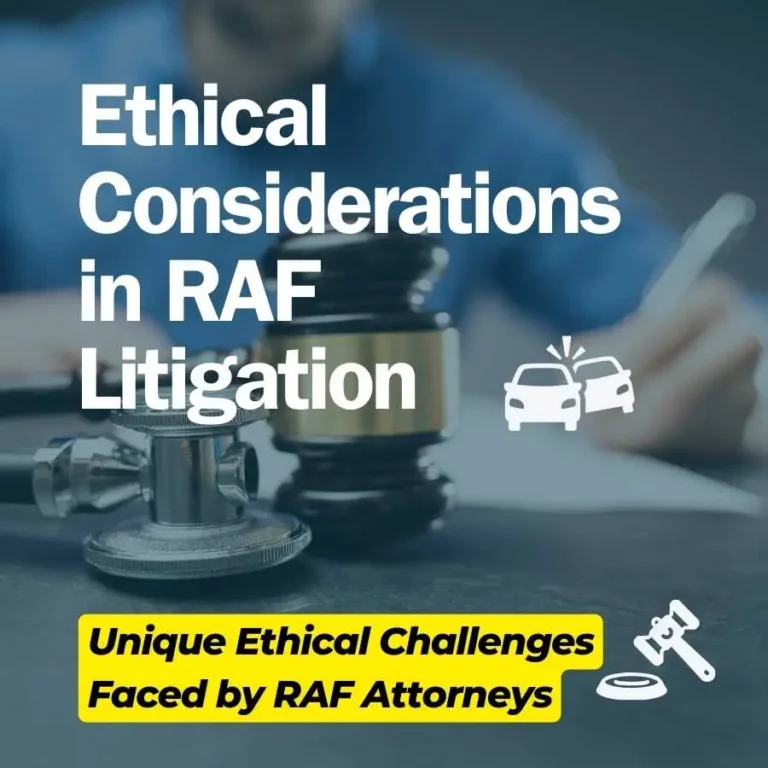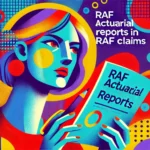Dive into the complex world of Road Accident Fund litigation, where the line between legal expertise and ethical integrity is often blurred. This article unveils the intricate ethical dilemmas faced by attorneys in RAF cases, from managing client expectations to navigating conflicts of interest. Discover how ethical challenges shape not just case outcomes but also the very fabric of legal professionalism in South Africa.
The Road Accident Fund (RAF) plays a pivotal role in the landscape of personal injury claims in South Africa. Established to provide compensation to individuals injured in road accidents or to the families of those who have died, the RAF is a cornerstone of support for many.
However, as with any legal process that involves injury, compensation, and emotion, RAF litigation is fraught with ethical complexities.
For attorneys handling RAF cases, navigating these ethical waters is crucial. Their conduct not only impacts the outcomes of individual cases but also the integrity of the legal profession and the trust placed in it by the public. Therefore, a deep understanding and adherence to ethical standards is paramount.

The Ethical Framework in Legal Practice
In South Africa, legal practitioners are bound by a set of ethical standards and codes that dictate their professional conduct. These guidelines are designed to uphold the dignity of the legal profession, ensure justice, and protect the interests of clients.
In the context of personal injury litigation, and specifically RAF cases, these ethical standards take on additional significance. The attorneys must balance their duty to their client with their responsibilities towards the court and the broader justice system.
Identifying and Managing Conflict of Interest
A conflict of interest in RAF litigation can arise in various scenarios.
For instance, an attorney might have a personal connection to a party involved in the claim or have a financial interest in the outcome of the case. Such conflicts can compromise the attorney’s ability to represent their client impartially and with undivided loyalty.
To effectively manage these situations, attorneys must first be adept at identifying potential conflicts early in the case. This requires a high degree of self-awareness and honesty.
Once a potential conflict is identified, the attorney must take steps to resolve it. This might involve withdrawing from the case, if necessary, or implementing measures to ensure that the conflict does not affect their ability to represent the client effectively.
Case studies from RAF litigation can serve as valuable learning tools in this regard.
For example, an attorney who previously represented defended the fund but is now involved representing the plaintiff may need to assess whether this past relationship poses a conflict. By examining such scenarios, attorneys can better understand how to navigate similar situations in their practice, ensuring that their conduct remains within the bounds of ethical legal practice.

Effective and Ethical Client Communication
The Importance of Clear, Honest, and Regular Communication with Clients
Effective communication is the cornerstone of any attorney-client relationship. This is particularly in Motor Vehicle Accident (MVA) litigation, where clients may be dealing with trauma and uncertainty.
Clear, honest, and regular communication helps build trust and ensures that clients are fully informed about their case. It involves not only updating clients on the progress of their case but also explaining legal concepts and procedures in a way that is accessible and understandable.
Attorneys should strive to avoid legal jargon, opting instead for plain language that demystifies the legal process.
Ethical Considerations in Maintaining Client Confidentiality
Client confidentiality is a fundamental ethical obligation in legal practice.
Attorneys must ensure that all communications and information pertaining to a client’s case are kept confidential, barring a few exceptions mandated by law.
This means being cautious about where and how discussions take place and ensuring that documents and electronic communications are secure.
Breaching confidentiality can not only erode client trust but also lead to professional disciplinary actions.
Challenges and Solutions in Communicating Complex Legal Issues to Clients
One of the challenges in RAF litigation is conveying complex legal issues, such as fault determination, compensation calculations, and procedural intricacies, to clients.
Attorneys can address this by using analogies or real-life examples, providing written summaries, and encouraging clients to ask questions. Regular meetings or calls can also help maintain a clear line of communication, ensuring clients feel supported and informed.
Ethical Fee Arrangements and Transparency
Overview of Common Fee Structures in RAF Litigation
In RAF litigation, fee structures can vary.
Common arrangements include contingency fees (where the attorney’s fee is a percentage of the compensation awarded) or other forms of deferred fee arrangement. Each fee structure has its merits and can be suitable for different types of cases or client circumstances.
Ethical Considerations and Legal Requirements for Fee Agreements
Ethical and legal considerations are paramount when establishing fee agreements. In South Africa, contingency fee arrangements are regulated by the Contingency Fees Act, 1997 which seeks to ensure they are fair to clients.
However, attorneys must go beyond the letter of the law to ensure that their fees are reasonable and commensurate with the services provided. They must also inform clients about the potential costs at the outset and obtain their consent.
The Importance of Transparency and Reasonableness in Billing and Costs
Transparency in billing and costs is critical in maintaining ethical standards.
This means providing clients with detailed invoices that clearly break down charges and expenses. Attorneys should avoid any hidden costs or unexpected fees, as these can lead to mistrust and potential disputes.
One example would be the handling of the bill of costs. This can often be a particularly thorny and confusing issues for many clients.
Reasonableness in billing also requires attorneys to consider the client’s financial situation and the complexity of the case. It also about ensuring that the charges are fair and justifiable. Regular updates on costs and expenses also help in maintaining transparency throughout the litigation process.
Managing Client Expectations Responsibly
Setting Realistic Expectations for Clients Regarding Case Outcomes
One of the key responsibilities of attorneys in RAF litigation is to manage their clients’ expectations realistically. This involves being honest about the potential outcomes of the case, including the likelihood of success and possible compensation amounts.
Indigent and desperate accident victims can sometimes become overly optimistic as to the prospects and outcomes of success. The urge not to completely deflate claimants and remove hope is understandable, especially by younger legal practitioners.
However, it’s important to inform clients about the various factors that can influence their case, such as the complexity of legal issues involved and the unpredictability of court decisions.

Ethical Issues Around Overpromising or Guaranteeing Specific Results
Ethically, it’s crucial for attorneys to avoid overpromising or guaranteeing specific results to clients. Doing so not only raises ethical concerns but can also lead to client dissatisfaction and a loss of trust if the promised outcomes are not achieved.
Attorneys should refrain from making assurances about case results, focusing instead on providing a realistic assessment based on their professional judgment and experience.
Balancing Hope and Realism in Client Interactions
While it’s necessary to be realistic, attorneys should also be sensitive to their clients’ emotional states and needs for reassurance.
This delicate balance involves providing hope and encouragement without straying into unrealistic promises. Case studies and examples are often a powerful way of bringing the message home in a tangible and understandable way.
The goal is to support clients through a difficult time while maintaining professional integrity and honesty.
Special Considerations for Vulnerable Clients
Identifying Vulnerable or Traumatized Clients in RAF Cases
RAF cases often involve clients who have experienced traumatic events, leading to physical, emotional, and psychological vulnerabilities.
Attorneys need to be adept at recognizing signs of vulnerability, such as emotional distress, cognitive impairments, or lack of understanding of legal processes.
This identification is crucial for providing appropriate legal support tailored to the client’s specific needs. For example, a motor vehicle accident victim who has sustained a sever head injury with brain damage may require dealing which go above-and-beyond what is required in, say, a commercial law firm dealing with intellectually sophisticated corporate clients.
Ethical Considerations in Providing Legal Support to These Clients
When dealing with vulnerable or traumatized clients, attorneys must exercise heightened ethical considerations.
This includes ensuring that clients fully understand their legal rights and options and are capable of making informed decisions about their case.
Attorneys should also be mindful of the power dynamics in the attorney-client relationship, ensuring that clients do not feel pressured or coerced into decisions.
The marvelous adage ‘with great power comes great responsibility’ comes immediately to mind.
Balancing Professional Legal Advice with Empathy and Understanding
Representing vulnerable clients requires a blend of professional legal advice and empathetic understanding. Attorneys should approach such cases with sensitivity, acknowledging the client’s experiences and emotions.
Communication should be tailored to the client’s level of understanding, and additional support mechanisms, such as referrals to counselling services, should be considered. Ultimately, the goal is to provide legal representation that respects the client’s dignity and aids in their overall recovery process.
Ethical Settlement Negotiations
The Role of the Attorney in Achieving Fair Settlements
In RAF litigation, attorneys play a crucial role in guiding their clients toward fair and just settlements. This involves not only a deep understanding of the law and the specifics of the case but also a commitment to ethical negotiation practices.
Attorneys should aim to secure settlements that adequately compensate their clients for their injuries and losses, considering both current and future needs.
Ethical Tactics and Strategies in Negotiation
Ethical negotiation tactics are grounded in honesty, respect, and a commitment to fair outcomes. Attorneys should avoid misleading or deceptive practices, instead relying on the strengths of their case and the evidence at hand.
It’s important to engage in open and honest dialogue with the opposing party and to seek a resolution that is in the best interest of the client while being fair and reasonable under the law.
Avoiding Undue Pressure or Manipulation During the Settlement Process
Throughout the settlement process, attorneys must be mindful of their influence on clients. They should avoid exerting undue pressure on clients to accept a settlement, especially if it may not be in the client’s best interest.
It’s crucial that clients make informed decisions, understanding the implications of accepting or rejecting a settlement offer.
Integrity in Evidence and Expert Testimonies
Ethical Handling and Presentation of Evidence
The ethical handling of evidence is fundamental in litigation against the Road Accident Fund. Attorneys must ensure that all evidence is obtained legally and presented truthfully. This includes not altering, fabricating, or omitting material evidence.
The integrity of the legal process relies on the honest and accurate presentation of information.

The Role and Selection of Expert Witnesses in RAF Cases
Expert witnesses play a significant role in RAF cases, often providing crucial insights into the medical aspects of the case. Selecting the right expert witness is therefore a key decision.
Attorneys should choose experts based on their qualifications, expertise, and the ability to provide objective and unbiased opinions.
The credibility and reliability of the expert are paramount.
Ensuring Honesty and Accuracy in Medical Reports and Expert Testimonies
When dealing with medical reports and expert testimonies, attorneys must ensure that these documents and statements are accurate and honest.
This involves a thorough review of the reports and, if necessary, seeking additional opinions to corroborate the findings. The attorney should also prepare the expert witness for testimony (where applicable), ensuring that their statements are clear, factual, and relevant to the case.
Misrepresenting or exaggerating evidence not only raises ethical issues but can also undermine the client’s case and the attorney’s credibility.
Upholding Court and Professional Integrity
The Attorney’s Responsibility Towards the Court and Legal System
Attorneys engaged in RAF litigation carry the responsibility of upholding the integrity of the court and the legal system.
However, this encompasses more than just adhering to the law.
It involves respecting the processes and principles that underpin justice.
Attorneys should conduct themselves with professionalism and honesty, ensuring that their actions and representations in court are in the best interest of justice.
Ethical Interactions with Opposing Counsel and Parties
Ethical practice extends to how attorneys interact with opposing counsel and parties. This includes maintaining a respectful and courteous demeanour, even in the face of disagreements or adversarial situations.
Professionalism demands that attorneys avoid personal attacks, misrepresentations, or any form of unethical behavior designed to gain an unfair advantage.
Case Studies Showcasing Ethical Dilemmas and Resolutions
Case studies in RAF litigation often reveal ethical dilemmas, such as handling conflicting interests or deciding whether to pursue a case with marginal chances of success.
These scenarios serve as valuable lessons in ethical decision-making, showing how attorneys can navigate complex situations while maintaining their ethical obligations.
Case Study 1: The Low Settlement Offer Dilemma
Attorney Bongani Dlamini’s Ethical Challenge with a Low RAF Offer (names have been changed to protect personal information)
Background: Attorney Bongani Dlamini represented Mr. Jabulani Ndlovu, who sustained serious injuries in a road accident. The RAF presented a settlement offer that was considerably lower than what Bongani believed could be achieved with more time. However, Mr. Ndlovu, facing financial hardships, was inclined to accept any immediate offer.
Dilemma: Bongani was caught in an ethical dilemma: respect his client’s urgent financial needs by accepting the low offer or advise him to wait for a potentially better, but delayed, settlement.
Resolution: Understanding his client’s dire situation yet mindful of his professional responsibility, Bongani had a candid discussion with Mr. Ndlovu. He explained, “While this offer provides immediate relief, it’s significantly less than what your claim is worth. I understand your urgency, but it’s my duty to ensure you receive fair compensation.” Bongani presented a detailed analysis of potential outcomes if they waited.
Outcome: After considering Bongani’s advice, Mr. Ndlovu agreed to pursue a better settlement, trusting Bongani’s experience and judgment. Several months later, they secured a substantially higher settlement. Reflecting on the decision, Mr. Ndlovu expressed gratitude: “Bongani’s guidance was crucial. His commitment to my best interests, despite my initial desperation, truly made a difference.”

Case Study 2: Navigating the Grey Area
Attorney Sarah Jacobs and the Case of Uncertain Outcomes (names have been changed to protect personal information)
Background: Attorney Sarah Jacobs was presented with a challenging RAF case involving Mr. Themba Nkosi, who had suffered minor injuries in a road accident. The case’s complexity lay in proving the negligence of the other driver, with no clear-cut evidence or witnesses.
Dilemma: Sarah faced an ethical decision. Whether to pursue a case with marginal chances of success, which could result in high emotional strain for Mr. Nkosi.
Resolution: Prioritizing ethical practice, Sarah had a candid conversation with Mr. Nkosi. She explained, “While I’m committed to fighting for your rights, we must consider the potential challenges and uncertain outcome of this case.” She laid out the risks and costs involved, ensuring Mr. Nkosi had all the information to make an informed decision.
Outcome: After discussing with Sarah, Mr. Nkosi decided to proceed, understanding the risks involved. Sarah worked diligently, utilizing every possible legal avenue to strengthen their case.
Despite the initial uncertainties, their efforts paid off, and they secured a modest settlement for Mr. Nkosi.
Reflecting on the case, Mr. Nkosi said, “Sarah’s transparency about the risks involved made me trust her judgment and dedication to my case, even when the odds seemed against us.”
These case studies demonstrate how attorneys in RAF litigation can navigate ethical dilemmas by prioritizing transparency, client welfare, and adhering to professional integrity, ultimately leading to trust-building and positive outcomes.

Navigating Systemic Challenges within the RAF
Discussing Systemic Issues in the RAF and Their Ethical Implications
The RAF, like any large system, faces systemic challenges, including bureaucratic inefficiencies and legal complexities. These issues can have ethical implications, especially when they impact the timeliness and fairness of settlements.
Attorneys must be aware of these systemic challenges and consider their ethical implications in their practice.
The Role of the Attorney in Advocating within These Constraints
Attorneys play a critical role in advocating for their clients within the constraints of the RAF system. This involves not just pursuing claims vigorously but also navigating the system in a way that upholds ethical standards.
Advocacy may sometimes require challenging systemic flaws or seeking reforms to enhance fairness and efficiency.
Balancing Client Interests and Systemic Challenges Ethically
The ethical balance in RAF litigation involves protecting client interests while acknowledging systemic limitations. Attorneys must strive to achieve the best possible outcome for their clients while being honest about the realities of the system.
This balance is crucial in maintaining client trust and the integrity of the legal process.
Conclusion
Summarizing the Key Ethical Considerations in RAF Litigation
Ethical considerations in RAF litigation encompass a wide range of practices, from client communication and conflict management to courtroom conduct and systemic advocacy. Each aspect requires careful attention to ensure that the rights and interests of clients are protected ethically and effectively.
The Broader Impact of Ethical Practice on the Legal Profession and Client Trust
Ethical practice in RAF litigation has a far-reaching impact, extending beyond individual cases to influence the legal profession and the trust clients place in it. Upholding high ethical standards is essential for maintaining the credibility of the legal system and ensuring justice is served fairly and impartially.
Final Thoughts on the Role of Attorneys in Maintaining High Ethical Standards in RAF Litigation
Attorneys engaged in RAF litigation hold a significant responsibility.
Their commitment to ethical practice not only affects the outcomes of their cases but also reflects on the legal profession as a whole.
By maintaining high ethical standards, attorneys contribute to a legal culture that values justice, fairness, and integrity, ultimately benefiting clients and society at large.
Navigating the RAF ecosystem is a journey fraught with ethical complexities and legal nuances. As we’ve explored, understanding these challenges is crucial for both legal professionals and those impacted by road accidents. Stay informed and educated on the intricate workings of the RAF. Subscribe to our newsletter at www.rafcash.co.za/raf-fact for insightful updates and expert guidance, helping you stay one step ahead in this ever-evolving landscape.
Frequently Asked Questions
What is the Road Accident Fund (RAF) in South Africa?
The RAF provides compensation to those injured in road accidents or to families of those who have died in such accidents in South Africa.
Why are ethical considerations important in RAF litigation?
Ethical considerations ensure that attorneys handle cases with integrity, uphold justice, and maintain the trust of their clients and the public.
What is a conflict of interest in RAF cases?
A conflict of interest occurs when an attorney’s personal or financial interests could potentially interfere with their duty to represent a client fairly and impartially.
How do attorneys manage conflicts of interest in these cases?
Attorneys must identify potential conflicts early and either resolve them or withdraw from the case to maintain impartiality and ethical standards.
What is the significance of effective communication in RAF cases?
Clear, honest communication helps build trust with clients, especially important in cases involving trauma and ensures clients are fully informed about their cases.
Why is client confidentiality crucial in RAF litigation?
Maintaining confidentiality protects the client’s sensitive information, upholds legal ethical standards, and preserves the attorney-client trust
What are some ethical challenges in fee arrangements for RAF litigation?
Ensuring fee arrangements are fair, transparent, and reasonable, and fully understood by the client, is essential to uphold ethical practices.
How should attorneys balance client expectations and realistic outcomes?
Attorneys should provide realistic assessments of case outcomes, avoiding overpromising while being sensitive to the client’s emotional state.
What special considerations are there for vulnerable clients in these cases?
Attorneys must approach vulnerable clients with empathy, ensuring they understand their legal rights and are not pressured into decisions.
How do attorneys uphold court and professional integrity in RAF litigation?
Attorneys must conduct themselves with honesty and professionalism, respect the legal process, and engage ethically with all parties involved in the case.

Let us help you find the perfect attorney
Find your ideal RAF attorney with RAF LAW – start your claim with confidence today!





